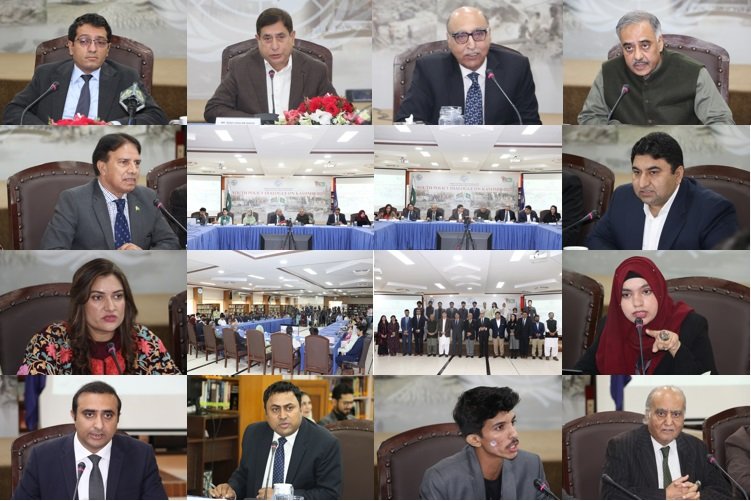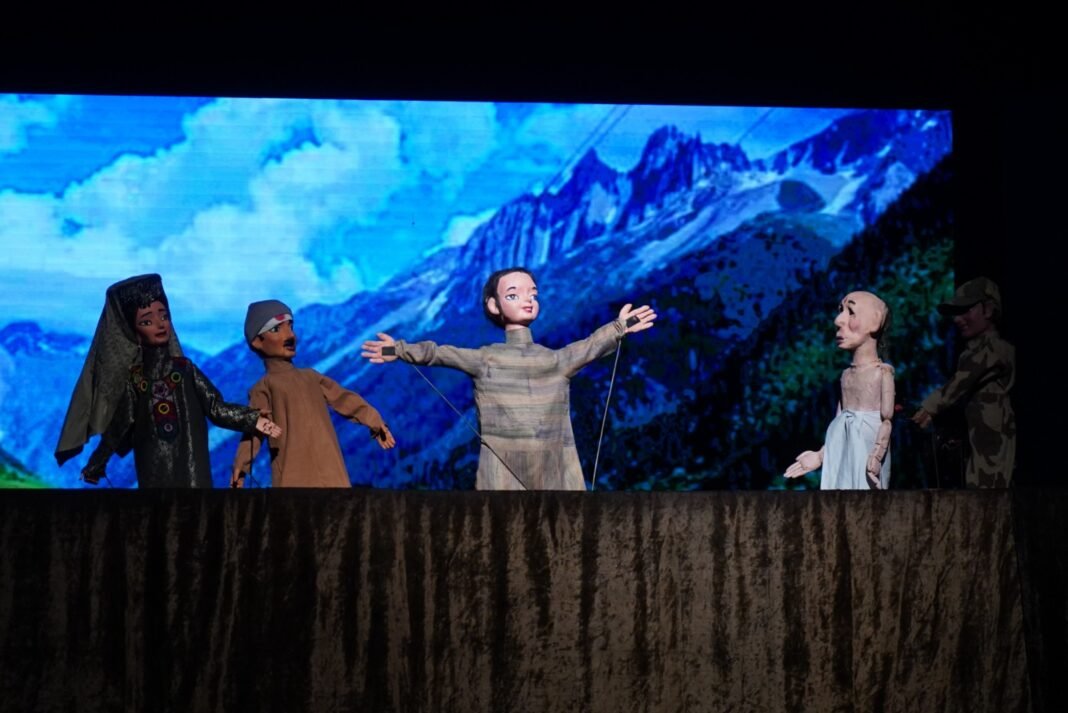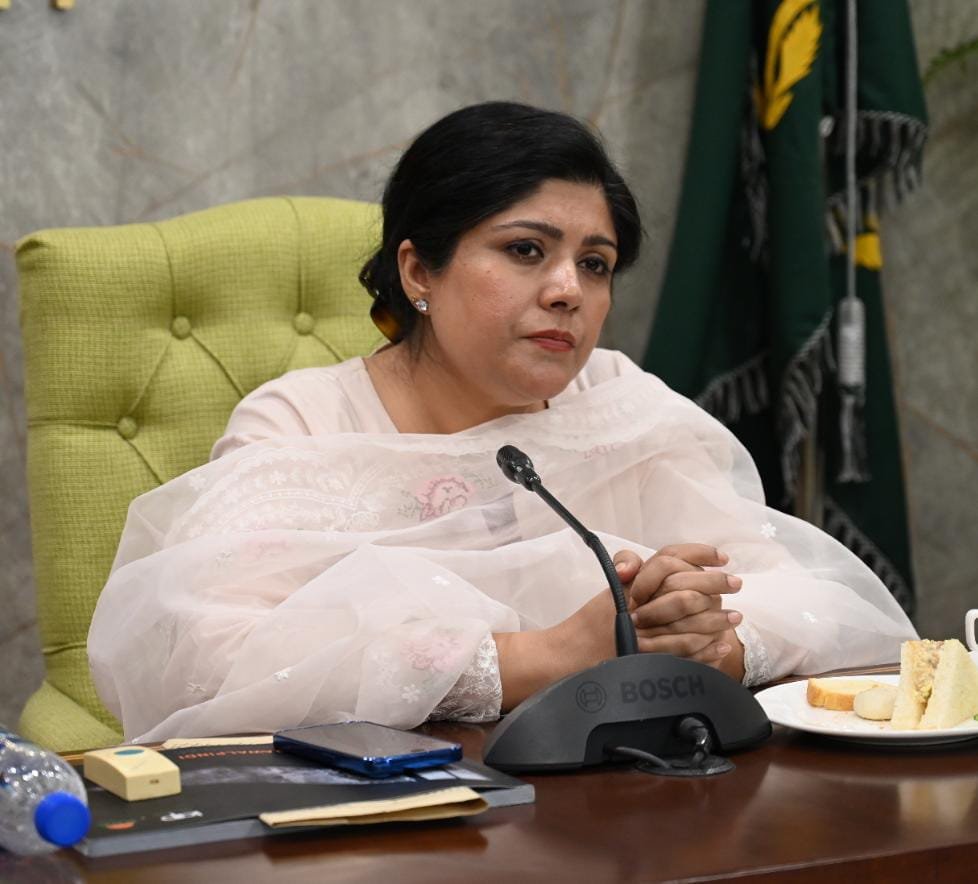
*ISSI hosts Youth Policy Dialogue on Kashmir 2025
Islamabad : India Study Centre at the Institute of Strategic Studies, Islamabad, organised an event “Youth Policy Dialogue on Kashmir 2025” in collaboration with Youth Forum for Kashmir. More than 150 students from across Pakistan took part in the dialogue. They were divided into four committees to discuss and analyse various aspects of the Jammu and Kashmir dispute, including Climatic Cost of Kashmir Conflict, Women and Children Rights in Kashmir, Solutions to Resolve Kashmir Conflict, and Arbitrary Detentions. The event was graced by Charge dAffairs Samir Ahmedli, of the Embassy of Azerbaijan as chief guest, whereas other speakers included Shah Ghulam Qadir, President PML-N AJK; Ambassador Abdul Basit; Prof. Dr. Muhammad Khan, Department of International Relations, International Islamic University; Naila Altaf Kiyani, human rights activist and political analyst; Barrister Nida Salam, Lawyer and Human Rights Activist; and Dr. Qamar Cheema, Executive Director, Sanober Institute, Islamabad.
Speaking on the theme “The United Nations and Conflict Resolution – The Azerbaijan Experience”, Ahmedli narrated the history of Azerbaijan’s conflict with Armenia. While the United Nations Security Council passed four resolutions in 1993, Ahmedli made special reference to Resolution number 62/243 adopted in March 2008. The resolution reaffirmed Azerbaijan’s sovereignty and territorial integrity and demanded the withdrawal of Armenian forces from the occupied territories. He highlighted the fact that Pakistan had been one country that always stood beside Azerbaijan and extended maximum support and solidarity.
Earlier in his welcome remarks, the Director General ISSI Ambassador Sohail Mahmood highlighted the importance of two dates – the 24th of October and the 27th October. On 24 October, the UN and the State of Azad Jammu and Kashmir were founded in 1945 and 1947, respectively. And on 27th October, India landed its troops in Srinagar to occupy the state against the wishes of its people. Historically, India has sought to justify its military intervention in the State of Jammu and Kashmir on the pretext of alleged “raiders’ invasion” and the so-called ‘Instrument of Accession’ allegedly signed by the Maharaja on 26 October 1947. Historical research has conclusively established that both these Indian claims are devoid of any foundation in reality.
There is a strong linkage between the Kashmir dispute and the United Nations. On 1 January 1948, India took the matter to the UN seeking to get Pakistan declared as ‘aggressor.’ The UN evaluated the matter objectively and affirmed the right of the Kashmiri people to self-determination and prescribed a free and impartial plebiscite under the auspices of the United Nations to enable the Kashmiris to decide whether they wish to join India or Pakistan. India initially agreed but subsequently reneged on its solemn commitments made to the Kashmiris, to Pakistan, and to the international community. It is now 78 years that the solution prescribed by the United Nations remains unrealized and the security Council’s resolutions unimplemented. Still, the UN had rendered the invaluable service of preserving the international legitimacy of the Kashmir issue, raising concerns over human rights, and monitoring LoC through UNMOGIP.
He highlighted that Pakistan’s youth is among the key stakeholders as far as major national issues and indeed the future of Pakistan are concerned. Youth’s engagement on Kashmir is of particular importance. This battle has to be waged by Pakistan’s next generation till a just and lasting solution is achieved. This requires the youth to be appropriately equipped – with full knowledge and understanding of the facts about the Kashmir dispute. Not only the false and misleading Indian narratives have to be resolutely and credibly countered, but also the international opinion shaped in favour of this just cause. In this context, he underscored the importance of full support for the Kashmiris, proactive diplomacy, and use of diverse means including political activism to scholarly works to cultural tools.
Dr. Khurram Abbas, Director India Study Centre, said that it is highly encouraging to see the enthusiasm shown by youngsters of Pakistan and participation in this very important debate on the Jammu and Kashmir dispute. This engagement with the youth of Pakistan is in line with the Institute’s policy that always encourages youth participation in all its events. He also expressed his delight at seeing a large number of female students expressing their interest in various aspects of the Jammu and Kashmir dispute.
In the first session, participating students presented detailed analyses and policy recommendations on four aspects of the Jammu and Kashmir dispute. On the issue of women and children’s rights in Jammu and Kashmir, the students highlighted the importance of the media and urged that more and more foreign media should be engaged. A very good suggestion of creating a digital memorial was also floated, as it was highlighted that speech must also be backed by solid facts. On the issue of climate, more active climate diplomacy was suggested by students. The melting of glaciers, especially the Siachen Glacier, because of human intervention was highlighted, which results in avalanches and floods. The gross human rights violations of the Kashmiri people at the hands of Indian security forces were also highlighted with emphasis that foreign media and rights groups must be given access to IIOJK so that they can gauge the extent of the humanitarian crisis firsthand. Suggestions about possible resolution of the Kashmir dispute were also floated by the young students.
Session two of the event comprised experts who gave their opinion on various aspects of the Jammu and Kashmir dispute. Shah Ghulam Qadir expressed his views on “Building Peace from the Frontier – AJK’s Role in Advocating Kashmir’s Cause.” He said that while India had been changing its discourse on the Jammu and Kashmir dispute, Pakistan has remained steadfast with its principled stand. Even after the lapse of eight decades, Azad Jammu and Kashmir is still the base camp of the freedom struggle of Jammu and Kashmir. Every person in Azad Jammu and Kashmir is on the frontline in the defence of Pakistan. No one should be misled by any event taking place in Azad Jammu and Kashmir, as every Kashmiri loves Pakistan.
Dr. Muhammad Khan, while expressing his views on “From Ceasefire Monitoring to Confidence Building: UNMOGIP’s Contribution to Regional Stability,” said that the connection between a Kashmiri and a Pakistani is unbreakable. He appreciated the role of UNMOGIP and highlighted the fact that India unilaterally decided that its presence is not needed and started restricting its activities. By doing so, India is violating the UNSC resolutions. He stressed that for peace and prosperity in South Asia, the Jammu and Kashmir dispute must be resolved.
Naila Altaf Kiyani expressed her views on “Conflict in the Himalayas: A Climate and Security Crisis in IIOJK.” She said that conflict and climate are closely related. In IIOJK, nature has been taken hostage as trees are being cut to establish camps for the security forces. She also highlighted the ever-growing number of pilgrims who come to IIOJK for the Amarnath Yatra.
Sohail Majeed is a Special Correspondent at The Diplomatic Insight. He has twelve plus years of experience in journalism & reporting. He covers International Affairs, Diplomacy, UN, Sports, Climate Change, Economy, Technology, and Health.





![logo-1[1]](https://globalnewspakistan.com/wp-content/uploads/2025/01/logo-11-e1737618310315-300x187.png)